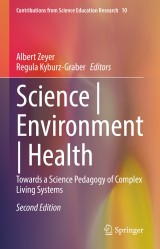Details

Science | Environment | Health
Towards a Science Pedagogy of Complex Living SystemsContributions from Science Education Research, Band 10 2nd ed. 2021
|
96,29 € |
|
| Verlag: | Springer |
| Format: | |
| Veröffentl.: | 09.12.2021 |
| ISBN/EAN: | 9783030752972 |
| Sprache: | englisch |
| Anzahl Seiten: | 285 |
Dieses eBook enthält ein Wasserzeichen.
Beschreibungen
This book provides a fascinating insight into the on-going process of self- reflection in the Science|Environment|Health (S|E|H) community. The basic vision of a new S|E|H pedagogy is to establish a transdisciplinary dialogue between the three educational fields of science education, environmental education, and health education. This approach finds growing interest among science educators. Since 2014, the ESERA special interest group S|E|H has united both experienced and junior researchers all over Europe in a burgeoning research community.<div><br></div>This book presents a selection of results of these vibrant activities. Systems theory has turned out to be a stimulating theoretical framework for S|E|H. The limits of predictability in complex living systems result in structural uncertainty for decision-making, and they ask for emphasising and rethinking the role of pedagogical concepts like informed citizenship and scientific literacy. They challenge crude scientific determinism inenvironmental and health education, which all too often ends up with students’ eco- and health depression. Instead, S|E|H conceives coping with uncertainty in terms of an interplay between cognitive and affective factors. The horizon of the future remains always open. Hope must never die in a new S|E|H pedagogy.<br><p></p><div><div>Chapter 3 is available open access under a Creative Commons Attribution 4.0 International License via link.springer.com.</div></div><div><br></div>
<p>1 Introduction.- Part I Beyond prediction and control.- 2 Coping with structural uncertainty in complex living systems.- 3 Narrativity in complex systems.- 4 "That is not my problem!" - Utilizing the concept of psychological distance in environmental and health education.- 5 Coping with the common dilemma in complex issues: The climate change example.- 6 The framing of health and sustainable development as individual responsibility contributes to the paradox of responsibility.- Part II Shifting the curriculum towards informed citizenship.- 7 Development of instruments to assess the Environmental Health competence: Focusing on internal coherence.- 8 Planet 2030 and inclusion for sustainable development.- 9 A teacher's perspective on socio-scientific issues.- 10 Implementing environmental and societal issues into science education through life cycle assessment.- Part III Promoting scientific literacy.- 11 The role of science education in decision-making concerning health and environmental issues.- 12 Science education as a barrier against "Fake Health News".- 13 Communicating new scientific paradigms: A case study on scientists' perceptions about contemporary metaorganism science and implications for Science|Environment|Health pedagogy.- 14 Teaching virology in school: An Analysis of student knowledge, textbooks, and other published materials, and a summary of essential virology knowledge for teachers.<br></p>
Albert Zeyer, Dr. med. et dipl. math., is a mathematical physicist and physician. After working as a science teacher and a children’s doctor in Swiss schools and hospitals, he was a senior researcher at the Institute of Education of the University of Zurich. He then became a professor of medicine at the Institute of Health Professions of the University of Applied Sciences Bern. Currently, he is professor of science education and head of science teacher education at the University of Teacher Education Lucerne, Switzerland. His research interests are the transdisciplinary dialogue of science, health and environmental education, and public understanding of science.<div><br>Regula Kyburz-Graber, Dr. sc. nat., Professor of Education for secondary school teachers at University of Zurich, Switzerland, 1998-2014. After her studies at ETH in Zurich she was a teacher for Biology in pre-academic classes and she founded research groups in environmental education projects. As professor at University of Zurich she was leader of various cooperative research projects with teachers in national and international contexts. Her research interests are environmental education/education for sustainable development, science education, science at the interface of nature and society, cross-curricular teaching and learning, reflective teaching, and self-regulated learning.</div><div><br></div><div><br></div>
This book provides a fascinating insight into the on-going process of self- reflection in the Science|Environment|Health (S|E|H) community. The basic vision of a new S|E|H pedagogy is to establish a transdisciplinary dialogue between the three educational fields of science education, environmental education, and health education. This approach finds growing interest among science educators. Since 2014, the ESERA special interest group S|E|H has united both experienced and junior researchers all over Europe in a burgeoning research community.<div><br></div>This book presents a selection of results of these vibrant activities. Systems theory has turned out to be a stimulating theoretical framework for S|E|H. The limits of predictability in complex living systems result in structural uncertainty for decision-making, and they ask for emphasising and rethinking the role of pedagogical concepts like informed citizenship and scientific literacy. They challenge crude scientific determinism inenvironmental and health education, which all too often ends up with students’ eco- and health depression. Instead, S|E|H conceives coping with uncertainty in terms of an interplay between cognitive and affective factors. The horizon of the future remains always open. Hope must never die in a new S|E|H pedagogy.<div><br></div><div>Chapter 3 is available open access under a Creative Commons Attribution 4.0 International License via link.springer.com.<br></div>
Unfolds the mutual benefit between science, environmental and health education Emphasises and rethinks the role of pedagogical concepts like informed citizenship and scientific literacy in environmental and health contexts Conceives coping with uncertainty in complex living systems in terms of an interplay between cognitive and affective factors Inspires a new and broadly welcomed approach to science education
Diese Produkte könnten Sie auch interessieren:

University Science and Mathematics Education in Transition

von: Ole Skovsmose, Paola Valero, Ole Ravn Christensen

96,29 €















